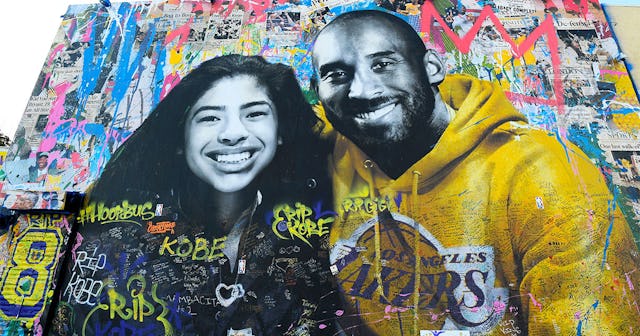I'm Thinking Of Those Grieving Families Now More Than Ever

I don’t know what it’s like to be Vanessa Bryant right now. I don’t know what it’s like to grieve over the tragic loss of both my life partner and my beloved daughter. I don’t know what it’s like to plan a funeral for two loved ones at once. And I don’t know what it’s like being surrounded by a world who feels like my loss is also their own, too.
I don’t know because these losses are not mine. I’ve never lost my spouse and my child all in one breath. I don’t know because I am not her. I don’t carry those unique relationships only she can have with her husband Kobe and daughter Gianna. But there is one thing I do know, one thing I do carry with me day after day, and that is the persistence of immense grief.
https://www.instagram.com/p/B8ZavYwDZ5y/
You see, my daughter died on a Sunday, too.
It was unexpected, and her absence completely undid my entire world. Even three years later, there’s not a Sunday that passes me by where I go without thinking about that morning — the first day where I truly realized what it actually meant to “have a bad day.”
At first, I couldn’t get on social media without seeing her obituary or GoFundMe shared from friends and family. There wasn’t an hour that came and went without someone texting, messaging, or trying to call me. But after the funeral, things changed. Almost in an instant, really.
The family of John Altobelli, son JJ Altobelli, his fiance Carly Konigsfeld and daughter Lexi Altobelli, speak during a memorial service honoring their father John, his wife, Keri, and their daughter Alyssa at Angel Stadium of Anaheim on February 10, 2020 in Anaheim, California.
Jayne Kamin-Oncea/Getty
Even if you know in your heart of hearts that everybody around you will “move on” while you’re grieving, it’s so much more painful when you’re the one who’s standing still while the earth beneath you keeps on spinning.
Now that it’s been a few weeks since the Bryant family, the Altobelli family, The Mauser family, the Chester family, and the Zobayan family all lost a huge chunk of their hearts, I’m thinking of them now more than ever, maybe because I, too, have been there. The news articles may fade, the tributes may turn into a slow trickle compared to what was in those early days, but these five families are remembered.
https://www.instagram.com/p/B8NVpT6ATBO/
No matter how much we hate it and pray for fate to prevent it or even change it, tragedy happens. And it’s only until then that you suddenly begin to hear the world telling the bereaved that they just “can’t imagine” such a heavy grief. It happened when my daughter died, and it’s happening even more so with the extensive number of losses the world has seen throughout these past few weeks. Maybe you, like me in past years, have spoken these words too.
This is the phrase I like to refer to as the “default response” to grief. It’s a filler sentence we innocently speak in hopes of helping to validate a grieving person’s pain. The thing is, though, it’s not true. Not really. It’s not that we can’t imagine another’s loss. It’s not that we can’t imagine what life is like for these families during this time. It’s that we don’t want to.
A makeshift memorial for Kobe Bryant and his daughter Gianna outside the Staples Center on February 1, 2020 at STAPLES Center in Los Angeles, CA
Icon Sportswire/Getty
We don’t feel comfortable doing so. Maybe without even realizing it, we block ourselves off from feeling a small portion of someone else’s immense pain.
But if we want to see more support for the bereaved beyond those fresh few days, this is one thing we need to socially change. Because when someone loses someone they love, one of the only things we can do for them is to imagine their pain, to pick it up off the ground and carry a portion of their deep grief underneath our wing.
https://www.instagram.com/p/B77K8XWDY7O/
There is nothing on this earth that makes the bereaved feel more isolated than to hear that nobody out there can fathom their circumstance. After all, if there’s not a single soul who can picture this life they are living — their current reality — how are they supposed to feel supported in this new world which they feel like they’re barely surviving?
A grieving mother, wife, daughter, husband, son, and grandparent do not feel like their life, however shocking and tragic it may be in the moment, is so “unimaginable” while they are living it day after day, week after week, and year after year.
That’s what this unfathomable grief is — lifelong. If we want to look it in the eye, then we have to see it for what it truly is… something that sticks with a person beyond the funeral. If we are to truly be someone who wants to support the bereaved, we need to remember that our empathy means just as much, if not more, in the latter days, too.
: A mural honoring Kobe Bryant and his daughter Gianna in Los Angeles, CA Icon Sportswire/Getty
We don’t know what it’s like to be a family member of someone who lost their life on January 26th, and we wouldn’t dare pretend that we do.
But we can imagine.
We can imagine a small fraction of their deep hurt.
We can imagine that this isn’t a grief that will vanish after the funeral.
We can imagine numerous nights filled with tear-stained pillows.
We can imagine the hurtful “firsts” that will come and go without their loved ones this year.
Out of so many things we cannot do, one of the only things we can do is to imagine.
This article was originally published on